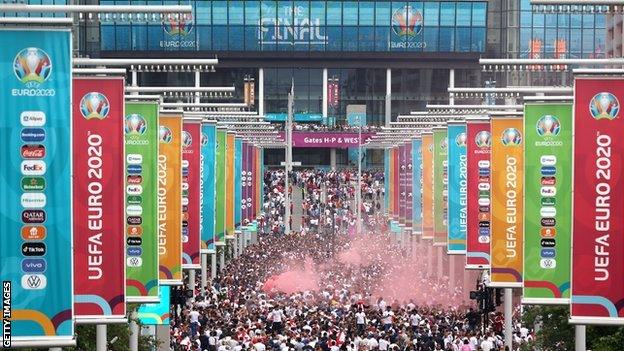Drug-related offences in football could mean five-year bans
- Published

England have been ordered to play one match behind closed doors as a punishment for the unrest at Wembley Stadium during the Euro 2020 final
Anyone caught in possession of or supplying class A drugs in connection with football faces a five-year ban and their passport being taken off them.
The new rules announced by the UK government are set to be introduced during the 2022-23 season.
"Middle-class coke heads should stop kidding themselves," said Prime Minister Boris Johnson.
"Their habit is feeding a war on our streets driving misery and crime across our country and beyond."
There were more than 800 football-related arrests across the top five English leagues in the first six months of this season, alongside more than 750 reported incidents of disorder.
A report into violence at the Euro 2020 final between England and Italy last year also found "ticketless, drunken and drugged-up thugs" could have caused death as they stormed Wembley.
The government said the new rules, which have been backed by the National Police Chiefs' Council, were being introduced "in a bid to prevent these hooligans from causing violence and disruption".
They will mean that those convicted of drug-related offences could have to surrender their passports when their team plays abroad.
"It's been a thrilling football season, but at some games we've seen ugly violence that has shocked all the leagues," said police, crime and probation minister Kit Malthouse.
"More and more the police are finding class A drugs at the heart of that disorder and so we must act. The football family wants every ground to be a safe space for fans, especially children, and so do we.
"Football banning orders have been a game changer in rooting out racism and violence at football, and now we want them to do the same for drug-related disorder."
The government said the changes announced will be rolled out through extending football banning orders, which are imposed by a court following a football-related offence and are designed to stop violence and disorder at games.
At present, they can be imposed on people convicted of violence, disorder and racist or homophobic chanting and were recently extended to cover online hate offences.
"I am pleased the government has updated the football banning order legislation to counter the growing issues of disorder we have seen, in part driven by the use of class A drugs," said NPCC football lead Mark Roberts.
Dr Martha Newson, an expert in football fan behaviour from Oxford University, has carried out studies into drug use at football.
She told BBC Sport that her research had shown an association between cocaine use and disorder at football - but that it could not be seen directly as "cause and effect".
She also said that making changes to football banning orders was not the approach to take.
"Cocaine is a serious drug - there are various health consequences and mental health issues," said Dr Hewson. "But the way to tackle that isn't by stigmatising it and putting a rule on not doing it at football. They are aiming it at football because it is quite an easy getout.
"It's class-based as well. It's easier to target a traditionally working-class part of our society and blame the disorder just on football culture, when it's all over society."

Our coverage of your Premier League club is bigger and better than ever before - follow your team and sign up for notifications in the BBC Sport app to make sure you never miss a moment
